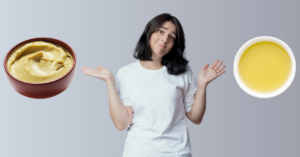Last updated on June 10th, 2024 at 01:09 pm

In the world of food choices, the debate between desi ghee and olive oil often comes up. Both have been important in traditional cuisines for a long time, each with its own flavors and possible health benefits. In this article, we explore the question: Can desi ghee replace olive oil for everyday cooking? To answer this question, we look at findings from two different but related viewpoints: the health benefits of olive oil and those of desi ghee.
Olive Oil’s Health Profile
Numerous studies, including “Olive oil consumption and human health: A narrative review,” highlight olive oil’s potential to promote human health. Rich in monounsaturated fatty acids (MUFA), particularly oleic acid, olive oil is renowned for its cardiovascular benefits. Research indicates that regular consumption may improve lipid profiles and reduce inflammation, thus lowering the risk of cardiovascular diseases.
Moreover, olive oil’s polyphenols contribute to its ability to lower blood pressure and enhance metabolic health, potentially reducing the incidence of type 2 diabetes. Its antioxidant properties also hold promise in cancer prevention and may support brain health, offering protection against neurodegenerative diseases.
Desi Ghee: A Nutritional Powerhouse
On the other hand, desi ghee, as explored in “Health benefits of ghee: Review of Ayurveda and modern science perspectives,” offers a rich array of health benefits deeply rooted in Ayurvedic tradition. Historically, ghee has been revered for its ability to improve digestion, enhance nutrient absorption, and promote vitality. From a nutritional standpoint, it contains fat-soluble vitamins such as A, D, E, and K, along with short-chain and medium-chain fatty acids. These components contribute to its digestive, anti-inflammatory, and cardiovascular benefits.
Despite earlier worries about saturated fats, recent research suggests that moderate ghee consumption may not significantly increase the risk of cardiovascular diseases. Instead, it may offer protective effects due to its unique fatty acid composition. Moreover, ghee’s role in supporting brain function and brain health is highlighted by its essential fatty acids and fat-soluble vitamins.
Can Desi Ghee Replace Olive Oil?
While both olive oil and desi ghee offer distinct health benefits, the question remains: can desi ghee effectively replace olive oil for daily cooking? The answer lies in understanding the cooking requirements and desired flavor profiles. Olive oil, with its lower smoke point and distinctive taste, is ideal for salad dressings, sautéing, and drizzling over finished dishes. On the other hand, desi ghee, with its higher smoke point and rich, nutty flavor, is well-suited for high-heat cooking methods such as frying and deep-frying, as well as for imparting depth to Indian and Middle Eastern cuisines.
Conclusion
The choice between desi ghee and olive oil for daily cooking depends on individual preferences, culinary traditions, and health goals. While olive oil offers a range of cardiovascular and antioxidant benefits, desi ghee boasts a rich nutritional profile rooted in Ayurvedic wisdom. By understanding their respective properties and culinary applications, one can harness the unique advantages of both fats to create flavorful, nourishing meals that support overall well-being. So, whether it’s drizzling olive oil over a salad or sizzling spices in desi ghee, both have a place in the kitchen and on the plate, enriching culinary experiences and promoting health in their own distinctive ways.
FAQs
Can I use desi ghee instead of olive oil for cooking?
Yes, you can use desi ghee as a substitute for olive oil in cooking, depending on the dish and desired flavor profile. Desi ghee has a higher smoke point, making it suitable for high-heat cooking methods like frying and deep-frying. It also adds a rich, nutty flavor to dishes, particularly in Indian and Middle Eastern cuisines. However, for recipes that require the distinct taste of olive oil or lower heat cooking, such as salad dressings or sautéing, olive oil may be the preferred option.
Is desi ghee better for heart health than olive oil?
Both desi ghee and olive oil can be part of a heart-healthy diet when consumed in moderation as part of a balanced diet. While olive oil's monounsaturated fatty acids have been extensively studied for their cardiovascular benefits, recent research suggests that moderate consumption of desi ghee may not significantly increase the risk of cardiovascular diseases. The key is to use fats in moderation and focus on overall dietary patterns that prioritize fruits, vegetables, whole grains, and lean proteins.
Does desi ghee or olive oil contribute to weight gain?
Like any fat source, both desi ghee and olive oil contain calories and can contribute to weight gain if consumed in excess. However, both fats can also be part of a healthy diet when consumed in moderation. Incorporating a variety of fats, including desi ghee and olive oil, into a balanced diet that aligns with energy needs and includes plenty of fruits, vegetables, and whole grains, can support overall health and weight management.
Are there any specific health conditions where desi ghee or olive oil is recommended?
Desi ghee and olive oil have been associated with various health benefits, but their suitability may vary depending on individual health conditions and dietary preferences. For example, individuals with lactose intolerance or dairy allergies may prefer olive oil over desi ghee. Similarly, those following traditional Ayurvedic practices or seeking alternatives to saturated fats may opt for desi ghee. It's essential to consider individual needs, consult with healthcare professionals, and incorporate a variety of healthy fats into the diet for optimal health.
References
1. Foscolou, A., Critselis, E., & Panagiotakos, D. (2018). Olive oil consumption and human health: A narrative review. Maturitas, 118, 60-66. https://doi.org/10.1016/j.maturitas.2018.10.013
2. Kataria, D., & Singh, G. (2024). Health benefits of ghee: Review of Ayurveda and modern science perspectives. Journal of Ayurveda and Integrative Medicine, 15(1), 100819. https://doi.org/10.1016/j.jaim.2023.100819